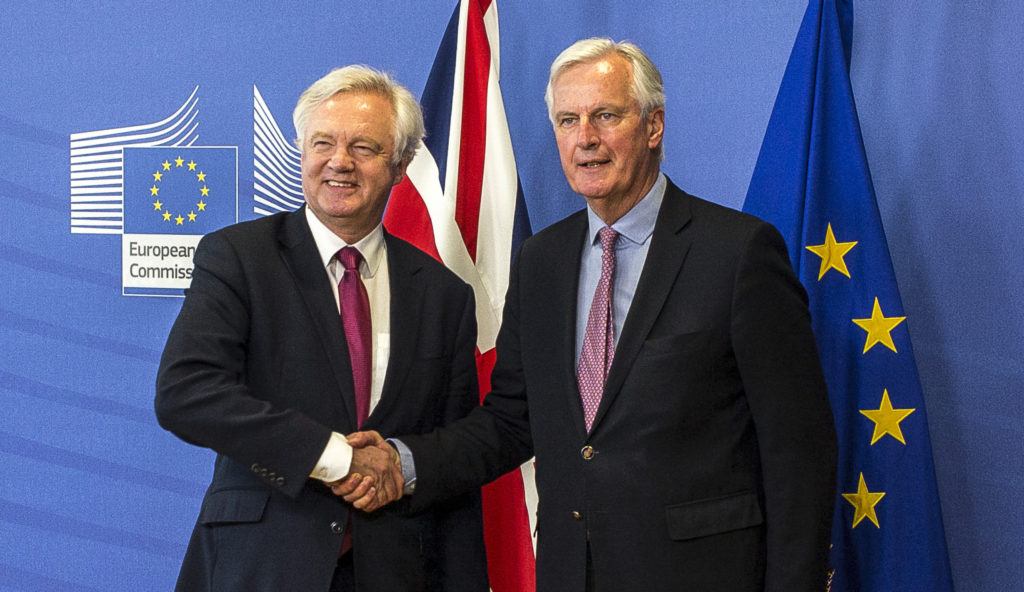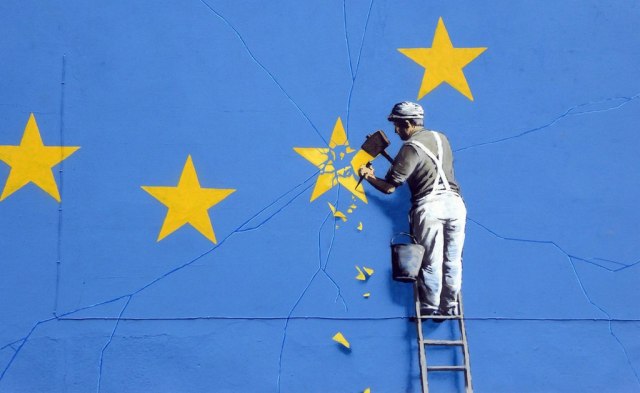Banksy does Brexit – www.banksy.co.uk

‘Free trade is not based on utility but on justice.’
So wrote Edmund Burke in 1795, capturing a timeless reality of commercial and political life.
Wealth is created and people are lifted out of poverty, the Irish political theorist and statesman argued, when trade is as open as possible, markets operate well and property rights are protected. As such, any country’s trade policy should aim to lower barriers faced by exporters while ensuring consumers can buy goods and services from abroad as cheaply as possible.
I have been re-reading authors like Burke, Adam Smith and Richard Cobden in recent months, in the context of Brexit. As the UK prepares to leave the European Union, the writings of these late 18th and 19th century radical thinkers, who supported open markets in defiance of the prevailing consensus of their age, are instructive.
Being outside the EU’s single market and highly-protectionist customs union will allow Britain to establish itself as a champion of global free trade, working to lower tariff and non-tariff barriers, so maximising cross-border commerce. There aren’t many universal lessons of history. One is that when countries trade extensively and freely, they rarely go to war. Trade fosters prosperity and peace.
This week’s column lays out two important principles relating to Brexit:
- The first is that, when it comes to the Article 50[1. “Article 50 of the Treaty of Lisbon gives any EU member the right to quit unilaterally, and outlines the procedure for doing so. It gives the leaving country two years to negotiate an exit deal and once it’s set in motion it can’t be stopped except by unanimous consent of all member states” – from The Daily Telegraph] negotiations, no deal really is better than a bad deal.
- The second principle is that, while free trade with the EU should be the UK’s ultimate aim after Brexit, we are more likely to get there in increments than in one step.
The best outcome from these Article 50 talks is that the UK and EU secure a free-trade agreement (FTA) before March 2019, when Britain is due to leave. Yet there is no pressing need to do so – and to think otherwise would be a major strategic error. If the UK ends up with no FTA with the EU, it can easily trade under World Trade Organisation (WTO) rules – paying relatively low tariffs on exports to the EU.

Trading under WTO rules is presented as ‘disastrous’ by the anti-Brexit crowd. This is nonsense. The UK trades under WTO rules with the US, China and almost every other large non-EU economy. While an FTA with the EU might be preferable, trading under WTO rules is fine.
There are two reasons the UK should get ready to trade under WTO rules with the EU – making necessary preparations which include taking back a WTO seat and setting own tariff schedules. If Britain isn’t prepared, the EU will be able to impose an unattractive FTA that would disadvantage UK exporters and consumers for years to come. That is why WTO rules are necessary as a credible alternative.
The second reason is that, with the best will in the world, agreeing a complex, multi-sector deal with twenty-seven governments, who each want to protect their own conflicting interests, may not be achievable over the next 18 months. Settling on such an agreement – which must then be ratified by national parliaments and the European Parliament, could be impossible during the timeframe.
There are enormous mutual incentives for the UK and EU eventually to strike an FTA. While UK exports to Germany are estimated to support some 752,000 British jobs, around 1.3 million German jobs depend upon exports to the UK. This pattern is repeated across other EU countries. So, the UK is in a strong position to negotiate an FTA with the EU, but should not become fixated on doing so before March 2019.
Trading with no FTA does not amount to ‘crashing out of the EU’ – as opponents of Brexit so often claim. While an FTA would be better, it is worth waiting until after March 2019 if that means securing a better long-term deal for Britain.
If Britain does trade under ‘no deal’, relatively low WTO tariffs will apply to UK exports to the EU. These average 2.3% – although they are higher in some sectors, such as cars and agriculture. In nearly all cases, though, EU tariffs are less than the extent to which sterling has depreciated since the EU referendum. The UK’s trade deficit with the EU also means mutually-imposed WTO tariffs will raise revenue, which the government can use to compensate exporters, as part of any transition arrangement. No deal is better than a bad deal, then – a principle the government should state clearly and often.
The second principle is that free trade should be a medium-term goal, not a one-off outcome. Some liberal economists argue that if Britain does end up trading under WTO rules with the EU after March 2019, the UK should grant the EU tariff-free access, even if Brussels imposes WTO tariffs. Although sympathetic to this view, on balance I disagree. Such a policy of unilateral free trade (UFT) is attractive in theory, and would definitely lead to lower prices for UK consumers and intermediate goods via cheaper imports – as captured in Burke’s quotation.
Free trade should a destination that Britain moves towards, though, rather than a policy shift linked to Brexit. Once outside the EU, trading under WTO rules, the UK will be well placed to negotiate a UK-EU FTA – which will, by definition, reduce import tariffs. But having WTO tariffs we can offer to remove will strengthen our hand in future negotiations, encouraging the EU to lower tariffs in response.

While I fully accept the medium-term gains from unilateral free trade, it will be important, as we approach the end of the Article 50 negotiation and after, to consider the economic dislocation to UK sectors currently behind the EU’s tariff wall – including agriculture and some parts of manufacturing. While it makes no sense permanently to subsidise producers at the expense of consumers, we should be mindful of the regional impact of exposing some domestic sectors to immediate global competition. As such, UK tariffs post-Brexit should be reduced boldly but steadily, alongside temporary ‘transition’ payments to certain sectors.
Even with such measures, there is much scope once outside the EU for the UK to return to the forefront of worldwide efforts to secure free trade among major economies. And keeping some tariffs will help negotiate away trade barriers maintained by other countries. This approach combines the benefits of free trade with a pragmatic grasp of domestic and international politics.
The nub of Burke’s insight – that the consumer gains of an open trade policy are considerable, and disproportionately benefit the poorest – came to the fore almost half a century after he was writing, when the UK repealed the Corn Laws. Backed by landowners and the establishment, these protectionist import tariffs on food were defeated by Conservative Prime Minister Sir Robert Peel and the Anti-Corn Law league. They led a moral crusade that lowered food prices and shifted the balance of economic power away from the elite to the people – by letting the market work.
Brexit can act in a similar way – taking the UK out of the EU’s protectionist customs union, so allowing Britain to lower import tariffs on non-EU goods. Yet the UK must use its new freedoms wisely, cushioning the most vulnerable and helping fragile sectors adjust – lest support for the broader whole is lost.
Ida Tarbell, the journalist and campaigner after whom this column is named, also backed free trade. During the 1890s and 1900s, she railed against import tariffs imposed by the US government, in cahoots with powerful domestic producers – which often outraged the American public. “The last man to be heard at tariff hearings is the man who buys to goods,” she wrote in 1906, “at a time when wealth is rolling up as never before, a vast number of hard-working people are really having a more difficult time making ends meet”.
Outside the EU, tariffs on non-EU goods will be much lower – which is set to make all kinds of imports cheaper, not least food. Import tariffs, which benefit producers at the expense of consumers, should be steadily phased out. Brexit allows this to happen, with Britain positioning itself, once again, as the global champion of free trade.
> Watch Liam Halligan’s new film about the life of Ida Tarbell










Join the discussion
Join like minded readers that support our journalism by becoming a paid subscriber
To join the discussion in the comments, become a paid subscriber.
Join like minded readers that support our journalism, read unlimited articles and enjoy other subscriber-only benefits.
Subscribe